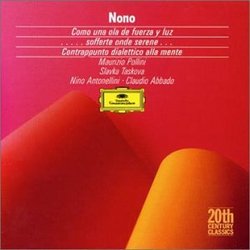| All Artists: Luigi Nono (Composer), Maurizio Pollini (Piano), Slavka Taskova (Soprano), Claudio Abbado (Conductor), Bavarian Radio Symphony Orchestra, Rome RAI Chamber Choir, Nino Antonellini (Director) Title: Luigi Nono: Como una ola de fuerza y luz, for Soprano, Piano, Orchestra & Magnetic Tape (1971-72) / ...sofferte onde serene... For Piano & Magnetic Tape (1976) / Contrapunto dialettico alla mente, for Magnetic Tape (1968) - Maurizio Pollini / Claudio Abba Members Wishing: 3 Total Copies: 0 Label: Dg Imports Original Release Date: 1/1/1988 Re-Release Date: 7/25/1988 Album Type: Import Genres: Pop, Classical Styles: Vocal Pop, Chamber Music, Historical Periods, Classical (c.1770-1830) Number of Discs: 1 SwapaCD Credits: 1 UPC: 028942324824 |
Search - Luigi Nono (Composer), Maurizio Pollini (Piano), Slavka Taskova (Soprano) :: Luigi Nono: Como una ola de fuerza y luz, for Soprano, Piano, Orchestra & Magnetic Tape (1971-72) / ...sofferte onde serene... For Piano & Magnetic Tape (1976) / Contrapunto dialettico alla mente, for Magnetic Tape (1968) - Maurizio Pollini / Claudio Abba
 | Luigi Nono (Composer), Maurizio Pollini (Piano), Slavka Taskova (Soprano) Luigi Nono: Como una ola de fuerza y luz, for Soprano, Piano, Orchestra & Magnetic Tape (1971-72) / ...sofferte onde serene... For Piano & Magnetic Tape (1976) / Contrapunto dialettico alla mente, for Magnetic Tape (1968) - Maurizio Pollini / Claudio Abba Genres: Pop, Classical
Luigi Nono was One of the Most Original and Influential Composers to Emerge from Post War Italy. Having Always Guided by a Keen Awareness of Social Unity (He Joined Italy's Communist Party in 1952) Nono's Works Often Take ... more » |
Larger Image |
CD DetailsSynopsis
Album Details Luigi Nono was One of the Most Original and Influential Composers to Emerge from Post War Italy. Having Always Guided by a Keen Awareness of Social Unity (He Joined Italy's Communist Party in 1952) Nono's Works Often Take the Form of Highly Empowering Expressive Public Spectacles. Here Among Others, Two of the Composers More Famous Longstanding Champions of his Work Mauricio Pollini and Claudio Abbado Perform Three of the Composers Most Evocative Works- the 'sofferte Onde Serene' and 'contrappunto Dialettico Alla Mente' Written Specifically for Them. If You Enjoy the Efforts of Stockhausen and Ligeti, Nono Will Certainly Be of Interest as Well. Similar CDs
|
CD ReviewsRevolutionary music. Augustus Caesar, Ph.D. | Eugene, Oregon United States | 08/30/2003 (5 out of 5 stars) "Luigi Nono (1924-1990) was one of the 20th century's most radical composers. Nono, who fought against the Fascists in the Italian Resistance during World War II, studied both music and law in the post-war years before joining the Italian Communist Party in 1952. During the mid- to late-1950s, Nono taught at Darmstadt, the center of European serialism, and with Boulez and Stockhausen was the foremost exponent of that music on the continent. Nono married Schoenberg's daughter, Nuria, in 1955, and severed his ties with Darmstadt in 1959, after delivering a lecture entitled "The Presence of History in the Music of Today." This lecture was the composer's most notable public statement concerning his own radical Marxist politics, and the 1960s and 1970s saw Nono taking an increasingly active role the affairs of the Communist Party, for which he served on the Central Committee. Like Pollini, Abbado, and Berio, Nono's worldview was permanently shaped by the subjection of Italy to the Fascism of Mussolini. All turned to Marxism in response, and Nono's deeply held political beliefs are on display throughout this magnificent collection of works from the late 1960s and early '70s. Unlike Stockhausen and Boulez, Nono saw in serialism a revolutionary musical grammar with implications extending beyond the realm of the purely musical into the realm of the political. Nono's adoption of serialism was a response to the domination of capitalism, imperialism, and the continued subjugation of the many by the few. Nono's music, which is initially forbidding and inaccessible, can be understood as the embodiment of Marx's concept of the unity of theory and practice. This is a revolutionary music, through which the composer expresses his hope for a world of true freedom rather than slavery, alienation, and mass murder."Como una ola de fuerza y luz" is dedicated to the memory of Lusiano Cruz, whose name is repeated in the work by the soprano vocalist (in this case, Slavka Taskova). Cruz, a Chilean revolutionary, died in 1971, two years before the Kissinger-planned coup which led to the death of Marxist president Salvador Allende and the installation of the Fascist Augusto Pinochet, who murdered Chileans en masse for the next 17 years. Nono's text implores the dead Cruz to "keep on glowing, young as the revolution in every one of your peoples' struggles." This powerful piece features thundering piano work from Nono's fellow Marxist, Maurizio Pollini, whose virtuosity is offset by the composer's jarring tape manipulations. A beautifully conceived and executed work.Pollini again contributes his piano skills to 1976's "... sofferte onde serene. . . ." Moments of lyricism are contrasted against Nono's magnetic tape arrangements, and the result is a stunning mixture of opacity and accessibility. A challenging, but ultimately satisfying work. "Contrappunto dialettico alla mente" (1968) again sets overtly political texts in Nono's pursuit of a total political engagement, "ideological and technical." Using words from Malcolm X and an anti-Vietnam War pamphlet, Nono crafts a work that is a reflection of the warped society it criticizes: terrifying, overwhelming, remorseless. The shrieking voices and intimations of violence echo the horrific destruction of the late-1960s. This is one of Nono's most important and ideologically characteristic works.Obviously, this is not music for everyone, but for the openminded and discerning listener, this disc contains treasures. Nono's work is among the most vital and dynamic to emerge from the 20th century avant-garde, and in our modern world of Fascism, war, and imperialism, the political message which lies behind Nono's music has never been more relavent." Massive Orchestral Violence Charles Sieracki | Irving, TX USA | 11/06/2003 (5 out of 5 stars) "Having posessed this disc for quite a few years I was surprised to see it again here. This is not music for the faint of heart. Ultimately this music is about destruction - maybe the lyrics are not, but the music itself is. Nono went on to other musical ideas later on in his career, but this truly is Nono at his most ruthless on the ear. This music demands a very high end stereo system and either no neighbors or deaf neighbors. The last movement of Como una ola... is pretty uncompromising. I find it the apex of anger, hatred and violence in music that I have heard so far out of the Nono catalog. The performances on this disc are first rate. No other recording (yes, there are others) approaches the intensity of this. Buy this if you are extremely agitated yourself or want to be." Get it while you can Jonathan Kandell | Tucson, AZ United States | 08/30/2003 (5 out of 5 stars) "I agree 100% with Autonomeus, this is a "must own"; I was excited to see they reissued it. The last piece "Contrapunto dialettico alla mente" is a classic from the tape-manipulation genre, mixing sounds of leftist 60s speeches with interesting effects. I don't think it's available anywhere else, so worth getting for this masterpiece alone. The sung line (in Italian) "Whitey wants you, n*gg**, to go to Vietnam and die" gives me shivers every time, even after hearing this piece many times. The second piece "...sofferte onde serene..." is a subtle complex piece admired by pianists but difficult to get a hook into for listeners. This is a great performance of it though. In my opinion this version of "Como una ola de fuerza y luz" isn't as good as the other recorded rendition--which is not what you'd expect considering it's Abaddo (who's excellent with Nono) and Pollini (who's Pollini)! Part of it is the singing; the passion of the singer on the other version is superior, maybe because she speaks Italian. Also, though Pollini's piano is noticably better in this rendition, something is missing from his overall performance. Maybe Nono is too--dare I say--raw for Pollini? Still, this performance is different enough from others that it is worth owning. Overall, terrific CD."
|

 Track Listings (9) - Disc #1
Track Listings (9) - Disc #1